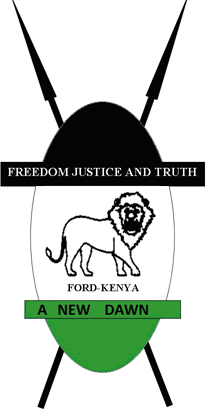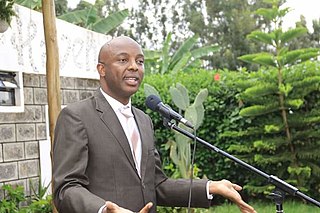
The politics of Kenya take place in a framework of a presidential representative democratic republic, whereby the president is both head of state and head of government, and of a multi-party system in accordance with a new constitution passed in 2010.

The National Assembly of Pakistan is the lower house of the bicameral Parliament of Pakistan, with the upper house being the Senate. As of 2023, the National Assembly has a maximum membership of 342, of which 266 are directly elected by an adult universal suffrage and a first-past-the-post system to represent their respective constituencies, while 70 are elected on reserved seats for women and religious minorities from all over the country and six on reserved seats for former Federally Administered Tribal Areas. Members hold their seats for five years or until the house is dissolved by the President on the advice of the Prime Minister. The house convenes at the Parliament House, Red Zone, Islamabad.

The House of Representatives of Puerto Rico is the lower house of the Legislative Assembly of Puerto Rico, the bicameral territorial legislature of Puerto Rico. The House, together with the Senate, control the legislative branch of the government of Puerto Rico.

The National Assembly is the directly elected house of the Parliament of South Africa, located in Cape Town, Western Cape. It consists of four hundred members who are elected every five years using a party-list proportional representation system where half of the members are elected proportionally from nine provincial lists and the remaining half from national lists so as to restore proportionality.

Elections in Kenya take place within the framework of a multi-party democracy and a presidential system. The President, Senate and National Assembly are directly elected by voters, with elections organised by the Independent Electoral and Boundaries Commission (IEBC).

Forum for the Restoration of Democracy–Kenya (FORD–Kenya) is a Kenyan political party. The party has sat in the government of Kenya once, under the National Rainbow Coalition, from 2003 to 2007, having ended forty years of one party rule. In April 2022, the party joined the Kenya Kwanza coalition for the August 2022 elections, and is headed by Moses Wetangula, the current speaker of the National Assembly of Kenya

The Parliament of Ghana is the legislative body of the Government of Ghana.

The Senate is the upper chamber of Nigeria's bicameral legislature, the National Assembly. The National Assembly is the nation's legislature and has the power to make laws, as summarized in chapter one, section four of the 1999 Constitution of Nigeria. The lower chamber is the House of Representatives.

The House of Representatives is the lower chamber of Nigeria's bicameral National Assembly. The Senate is the upper chamber.

The National Assembly of the Republic of Kenya is one of the two Houses of the Parliament of Kenya. Between 1966 and 2013, it served as a unicameral house. In 2013, it became the lower house when the Senate was reestablished.

The National Assembly is Mauritius's unicameral legislature, which was called the Legislative Assembly from 1968 until 1992, when the country became a republic. Prior to 1968 and under British rule it was known as the Legislative Council. The Constitution of Mauritius provides for the parliament of Mauritius to consist of the President and the National Assembly. The parliament of Mauritius is modelled after the Westminster system of parliamentary democracy, where members of parliament are voted in at regular general elections, on the basis of a first past the post system. The working language of the National Assembly is English.
Johnson Nduya Muthama is a Kenyan businessman and politician. He is serving as a Commissioner of Parliamentary Service Commission.

The Government of the Republic of Kenya (GoK) is the national government of the Republic of Kenya, a federal republic located in East Africa, composed of 47 Counties, each county with its own semi-autonomous governments, including the national capital of Nairobi, where the national government is primarily based.

Party leaders of the United States House of Representatives, also known as floor leaders, are congresspeople who coordinate legislative initiatives and serve as the chief spokespersons for their parties on the House floor. These leaders are elected every two years in secret balloting of their party caucuses or conferences: the House Democratic Caucus and the House Republican Conference. Depending on which party is in power, one party leader serves as majority leader and the other as minority leader.

Ekwee David Ethuro is a Kenyan politician. Currently is the Chairperson Higher Education Loans Board (HELB). He was elected as the first Speaker of the modern Kenyan Senate on 28 March 2013. From 1998 to 2013 he served as a Member of Parliament representing Turkana Central. He also served as the Assistant Minister for Planning and National Development from 1998 to 2002 under the government of President Daniel arap Moi. He was re-elected as Member of Parliament for Turkana Central in the 2007 general elections and steered the proceedings of the 10th Parliament in the position of acting Speaker of the House whenever the Speaker and the Deputy Speaker were absent.

Irungu Kang'ata is a Kenyan politician. He is the governor of Muranga County. He also is the former senator of Murang'a County, and the former Senate of Kenya Majority Chief Whip, former member of parliament for Kiharu Constituency and a former Councillor for Central Ward in Murang'a town. He is a law graduate from the University of Nairobi and a principal in the firm Irungu Kangata & Co. Advocates located at Flamingo Towers 4th floor, Upperhill, Nairobi. He holds PhD (Law) University of Nairobi and teaches law at Catholic University of Eastern Africa, Nairobi.
Beatrice Elachi is a Kenyan politician who currently serves as the member of parliament for Dagoretti North constituency. Prior, she served as Speaker of the Nairobi County Assembly from 6 September 2017 until her resignation on 11 August 2020. As Speaker of the Nairobi County Assembly, she replaced Alex Ole Magelo, who did not contest his seat. Immediately prior to her election, she was the Majority Whip in the Kenya Senate.

The 27th South African Parliament is the sixth Parliament of South Africa to convene since the introduction of non-racial government in South Africa in 1994. It was elected in the general election of 8 May 2019 and consists of the National Assembly and the National Council of Provinces. The National Assembly contains 400 members, while the National Council of Provinces contains 90 members. It was formally opened by President Ramaphosa's State of the Nation Address in a joint sitting on 20 June 2019.

Kenya Kwanza is a Kenyan political alliance currently headed by William Ruto. The political coalition currently holds a majority in both the National Assembly and Senate of Kenya. It was formed in the period leading up to the 2022 Kenyan general election, originally consisting of three parties: the United Democratic Alliance (UDA), Amani National Congress and FORD–Kenya. By 8 April 2022, several more political parties had joined the alliance, bringing the total number of constituent parties to 12. On 18 August 2022, a number of politicians from the United Democratic Movement announced they would be joining the alliance.















